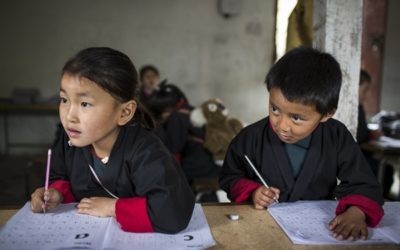– Joaquim Magalhães de Castro
In an interview with Asia Focus magazine in 1993 (two years before his death), Father Mackey said that his mission was to “witness to the Catholic Faith without proclaiming it; to bear witness to Christ without proselytizing,” and, of course, to teach the English language, for that was his specialty.
As is well known, Buddhism is the state religion of Bhutan and the government does everything to preserve it. Accordingly, the authorities do not allow the presence of other religions in the territory, and “the preaching and propaganda of Christianity is prohibited.” All schools are state owned.
But it was not always so. In the past, Jesuits were invited to help set up schools and take on responsibilities as providers or principals. Thus seven priests and ten nuns (sisters of the St Joseph of Cluny and Holy Cross congregations) once worked in Jesuit-run schools. In addition, some Salesian priests also contributed to the opening of a technical school near the Indian border, having run this institution for some time. However, they would leave in 1989, as the Bhutanese Government wanted the direction of all colleges and schools to be reinsured by qualified Bhutanese. He therefore asked Fr Mackey to work under their direction.
“Of course we could not accept such conditions,” says the Canadian priest. “Also because the government wanted each of us to work in a different school. We missionaries usually live in community and work together. That is our philosophy.” Therefore, the Government proposal was unacceptable.
For this reason, most priests returned to the diocese of Darjeeling. Father William Mackey, by contrast, chose to stay in Bhutan, because he considered himself a Bhutanese citizen. Lacking churches in Bhutan, his residence served as a temple. It was there that he prayed and celebrated Mass on one weekday and on Sunday, with the attendance of some 30 Christians, most of them members of the various diplomatic missions.
“The literacy rate was close to zero when I arrived here. Today it is 40%. I founded the first high school in Tashigaon; then a university institution known as Shrubtse College,” the Canadian said in an interview with Asia Focus.
Subsequently, under his direction, Bhutan would open five pre-university institutions, twenty-one secondary schools and two hundred primary schools.
“My job was to establish an effective school education system in Bhutan, overseeing the schools to make them work properly. To this end I visited schools throughout the kingdom, often traveling on foot and on horseback. I faithfully serve the country that adopted me, always striving for the development of its education system, while preaching moral values and mutual help, as this is also a way of evangelizing,” concluded the Canadian Jesuit.


 Follow
Follow


